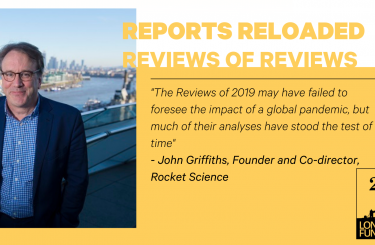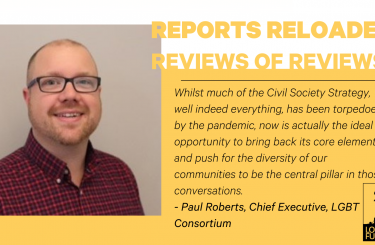Related


To celebrate 25 years, we're looking back at London Funders' archive of reports and think pieces. What has changed? What remains relevant? How can we build on past lessons and analysis to inform the future of funding?
To gain different perspectives on the reports, we’ve been asking several key funders and stakeholders to reflect back to see what learning still applies and how funders can move forward together to tackle key issues facing London ‘post’-pandemic. In this piece, we asked Dame Julia Unwin to reflect on the inquiry she chaired into the future of civil society back in 2018 and share lessons on the good, the bad and the ugly in the years that followed the inquiry.
In November 2018 an inquiry into the future of civil society, which I chaired, published its final report, Civil Society Futures. Thanks to the work of brilliant colleagues and the input from many organisations and individuals, within and outside civil society, we tried our best to predict the trends and changes that faced civil society in the coming years. We listened hard to the experiences of people all over the country, trawled through oceans of data and examined the opinions of experts in coming up with our report.
Now three years on, three very difficult years, it is worth asking the question, what did we get right? And what did get we wrong? What did we spot? And what did we miss?
Well, we said that we were heading for challenging times (how right we were!). We talked about precariousness – the likelihood of economic volatility, civil unrest, cyber-attack, terrorism and every other sort of chaos, but what we did not foresee was a global pandemic that at the time of writing, has now lasted for nearly two years. A pandemic which has seen half of us working from home, caused huge dislocation to the economy, added to the enormous pressures on the depleted NHS and opened up major fault lines in politics and society as a whole.
We did say that ‘we need to talk about race’ and argued that a huge weakness for civil society in England was its failure to properly address questions of race, and work to face up to the huge damage that is caused by racism. The massive impact of the murder of George Floyd, and the subsequent Black Lives Matter movement, has challenged all of us to think differently, more deeply and more seriously about race and racism. We were right to acknowledge that civil society needs to make progress on this issue.
Most importantly, we said that civil society, renewed and reenergised, was the only way we would meet the challenges of our times.
We also said that associational life – the ability of individuals and communities to get together – was incredibly important. Whether it was a choir or an allotment society, a major national charity or a new and emerging network, our report pointed out people really cared about the places they lived in and mourned the lack of shared spaces. The last two dreadful years have demonstrated the truth of this insight.
Most importantly, we said that civil society, renewed and reenergised, was the only way we would meet the challenges of our time – the climate crisis, the democratic deficit and our frayed and exhausted social fabric. If the last two years have taught us anything, it has been that civil society – in all its richness and diversity - is in a parlous state, but it is still, despite everything, our best hope of success.
From the last two dreadful, epoch-changing years, here’s what we’ve learned: the good, the bad, and frankly, the ugly.
We’ve learned that in every city and town, in every neighbourhood, in every place, people want to help their neighbour. The ‘explosion of mutual aid’ which followed the early days of lockdown took government by surprise but astonished no-one who knew about the realities of local communities and the deep connections which existed below the radar of much of officialdom. We also learned that in the places where local government was really used to working in genuine partnership with community groups, amazing things happened.
We’ve learned that when push came to shove, some of the biggest funders were able to change their rules and approaches to get money to the places it was needed - quickly and efficiently.
We’ve learned that at their very best, partnerships between national bodies and small local networks were productive and made a big difference in hard times.
And we learned that without noisy advocates, public policy in a crisis would just ignore those groups already easily overlooked - people with cancer, for instance, those with chronic and challenging conditions and those women and children to whom a ‘stay at home’ order was a sentence to abuse and cruelty. Their voices were amplified by supporters in the charity world whose deep connections and awareness of what was happening meant that policymakers had to sit up and take notice of their needs.
But there was some bad news too. We’ve learned that organisations ‘running hot’, whether in private, public or voluntary sector cannot both ‘run hot’ and deal with an unexpected crisis. We got an insight into the precarious nature of so many essential services, when many groups faced closure, and in Black led groups were particularly at risk. When national charities had to lay off staff as fund raising activities and high street shops closed, demonstrating that this is no way to pay for the services on which we all depend.
We’ve learned that organisations ‘running hot’, whether in private, public or voluntary sector cannot both ‘run hot’ and deal with an unexpected crisis.
And we learned that government, in England at least, really doesn’t understand the role of the charitable and voluntary sector. When the Chancellor seemed to think that bodies running essential services could simply furlough their staff, it became horribly clear that we have not succeeded in explaining the vital role of this complex and interdependent web of organisations, groups, networks and movements.
Revelations of poor practice, of bullying, and of racist, homophobic and misogynistic behaviour in all sorts of supposedly ‘worthy’ organisations were devastating. The hard work of making sure that the culture of civil society is fit for the 21st century became ever more urgent. It will be taxing and painful to make some changes but hiding our weaknesses or our failures means we will fail to achieve our potential in difficult times.
The hard work of making sure that the culture of civil society is fit for the 21st century became ever more urgent.
In Civil Society Futures, we argued for a PACT for civil society. A new strategic approach to addressing the behaviours attitudes and practices which form our cultures. We started with a new focus on Power. Power is obviously not evenly distributed, and one of the vital roles of civil society is to ensure that those who could have power because of their experience, are able to use that experience to change the minds of those who do hold the power to affect their lives. We also made the case for a new focus on Accountability. To focus less on accountability to funders, regulators and government, but the essential accountability to our communities. And we maintained that Connection is at the heart of civil society - that deep connection between people in communities and between movements and networks and big organisations. Unless we do more to deepen our relationships within civil society, we will always be hampered and undermined. And finally, we argued that we needed to invest in Trust, an asset worth more than anything else on our depleted balance sheets, which makes it possible for us to thrive.
Focus less on accountability to funders, regulators and government, but the essential accountability to our communities.
The last two years have been devastating, there’s no doubt about that. An exhausted voluntary sector will be asked to do more, and to play a key part in rebuilding for a better, greener, more equal future. It seems to me that our Inquiry three years ago identified the essential strength and capability within civil society and suggested some ways in which we could truly be ready for the challenges ahead. It is as relevant now as it was then.
Dame Julia Unwin was the Chief Executive of the Joseph Rowntree Foundation and the Joseph Rowntree Housing Trust from 2007 until the end of 2016. She has researched and written extensively on issues relating to philanthropy, the voluntary sector, and its relationship with government and has written several books, the most recent of which is entitled “Why Fight Poverty?” which was published in November 2013. In November 218 a report on her work as a fellow of Carnegie UK Trust was publishedShe chairs the Governing Body of York St.John University and was appointed in September 2021 the inaugural chair of the Global Open Finance Centre of Excellence at Edinburgh University. She chaired the Independent Inquiry on the Future of Civil Society which reported in November 2018.

